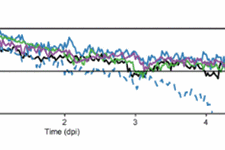News

A universal influenza mRNA vaccine shows promising results in ferrets
An article published in Science Advances in December of 2022 looked into the efficacy of nucleoside-modified mRNA-LNP vaccines technique. During the Covid-19 pandemic it was shown that vaccine based on this technique has great potential. Traditional influenza vaccines are limited in their ability to protect against new or mutated strains of influenza viruses. Few mutations are needed to increase human susceptibility to the influenza virus and with that increasing their pandemic potential. In a current study, a group of scientists investigated the possibility to activate and inducing T-cell responses to subtypes of influenza infections with a mRNA-LNP vaccine. This is based on the natural defences of T-cell that clear infected cells, and T-cell immunity is associated with better disease outcome for people.
Baseline temperature established 5 days before inoculation
A group of scientists from RIVM and UMC in the Netherlands with scientists from USA and Canada, used 63 female ferrets in this study and a subset of those were implanted with Star-Oddi DST micro-T temperature logger intra abdominally. The temperature loggers were configured to measure the core temperature every 30 min. during the study trial. The researchers established baseline temperature by determining the average temperature in the five days prior to infection. The individual temperature variation was shown as deviation from the baseline.
Hypothermia observed in a few ferrets
Hypothermia was observed in three animals starting at day 2 after infection and were euthanized at day four instead of day five. In general, the prior therapy had no effect on the height and duration of the fever, since all groups showed equivalent rises (fever) in body temperature. The dip at day 0 was caused be anesthesia of the ferrets during inoculation.

Figure 4.D from the article showing the temperature in the days after viral inoculation
Result show potential of influenza mRNA-LNP vaccine
The results from this study showed that the nucleoside-modified mRNA-LNP T cell vaccine is a promising candidate to boost broadly reactive cellular responses and can be used to enhance protection against heterosubtypic influenza viruses. Furthermore these result show that this kind of vaccine could results in decrease of severe influenza disease and deaths, hence decreasing the societal effect of future influenza epidemics and pandemics.

